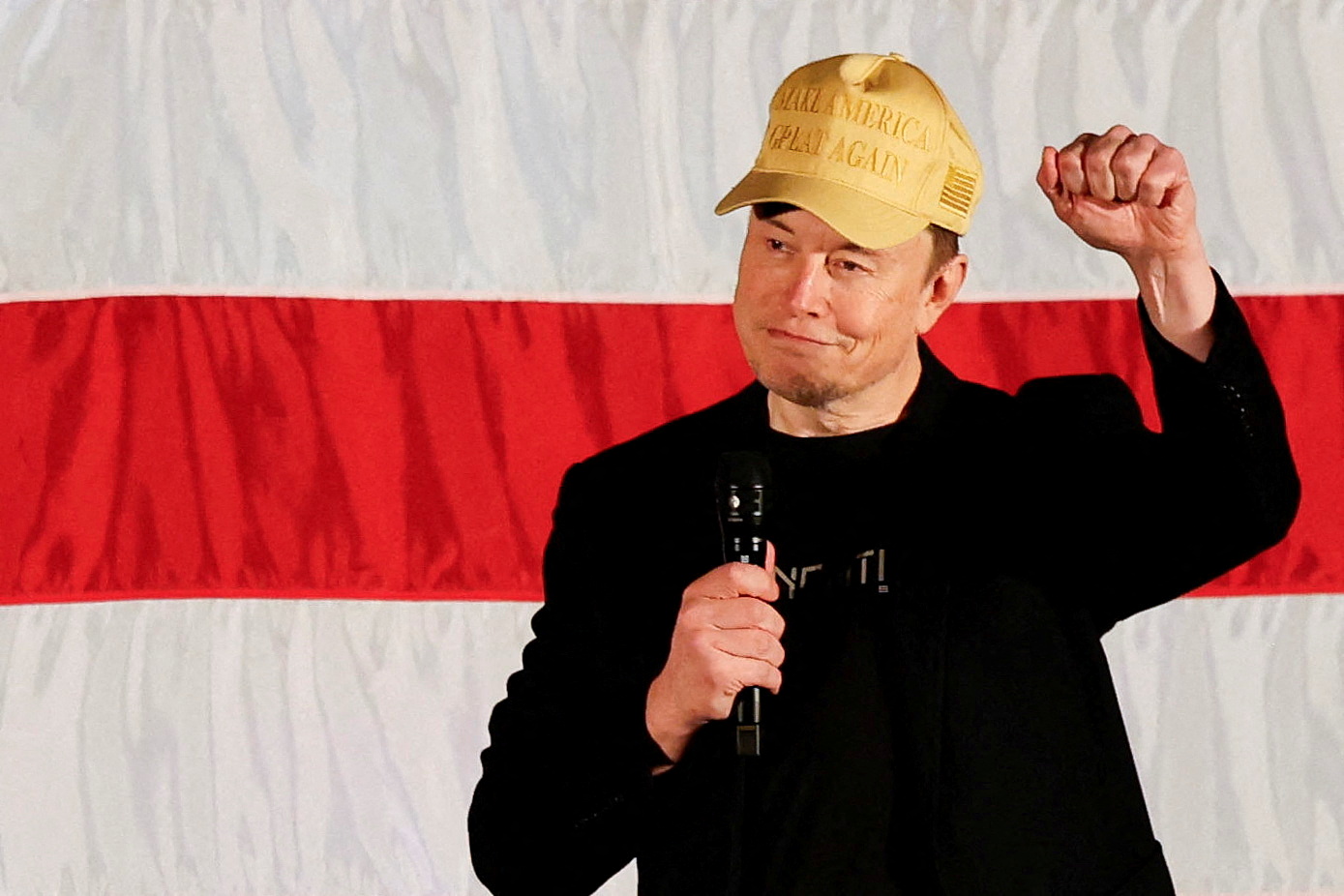Elon Musk Is the Perfect Mascot for Trump 2.0
Out with the past, in with the future.
by Kojo Koram
10 December 2024

In 1955, writing in the very first issue of the National Review – now the bible of the American right – William F. Buckley declared a mission statement for American conservatism. Buckley explained that “a conservative is someone who stands athwart history, yelling stop, at a time when no one is inclined to do so, or to have much patience with those who so urge it.”
For most of the 20th and early 21st centuries, that is exactly what US Republican leaders did. They would be the people yelling “stop” in the face of social, cultural or even economic progress. They would scream “stop” against the prospect of gay marriage, racial justice and increased labour rights – even such innocuous trends as rock’n’roll and video games. In America, perhaps more than anywhere else, the conservative mind was like Lot’s wife: always anxious to snatch one more look backwards at a lost home.
When Donald Trump was elected president for the first time in 2016, he had ridden a wave of anger drawn from these deep reservoirs of nostalgia. In the aftermath of the war on terror, the 2008 financial crisis, the collapse of American industry and the shift towards majority-minority demographic change, Trump promised to make America great again, to take life back to what historians now call the American century. The campaign directly appealed to middle-aged and elderly voters who liked to watch second world war documentaries and imagine they were at Normandy, or who still dreamed of a lost love from a trip hitchhiking across the country in their youth. However, as Trump returned in 2024, the left mistakenly assumed he was offering the same sepia-toned nationalism. He wasn’t.
This time, Trump’s campaign also resonated with a younger, tech-savvy (usually male) demographic that had grown up between his 2016 and 2024 election wins and found themselves concerned not with what has been lost from an idealised past but with what treasures they might find in the ruined temples of the future. This cohort of 2024 Trump fans was equally disillusioned by the collapse of the traditional US economy but they did not want to shout “stop” and return to the factories and car plants of the mid-20th century. Instead, these high-energy, digitally native self-starters wished to drive headfirst toward crypto, AI, platform-based work and speculative entrepreneurship. And they had a champion in the man who probably gained the most from this election besides Trump: Elon Musk.
In addition to driving Trump’s successful campaign in the media, Elon Musk was announced as co-lead of Donald Trump’s newly-formed Department of Government Efficiency. Doge, its acronym a nod to Musk’s favoured cryptocurrency, Dogecoin, and the internet meme culture that has swung firmly behind Trump in recent years, is not just an attempt to troll liberals. This initiative is likely to have real teeth, with a mandate to cut bureaucracy and slash government spending by up to $2tn.
Musk and his Doge co-lead, Vivek Ramaswamy, share a desire to strip the administrative state down to its bare bones. They have talked about firing 75% of federal employees and cutting down the number of federal agencies from 428 to 99. Some of the agencies reported to be in the firing line include familiar conservative targets like Planned Parenthood, which provides reproductive rights for women or the Corporation for Public Broadcasting, which produces National Public Radio (NPR) and Public Broadcasting Service (PBS) shows. But also facing Musk and Ramaswamy’s chopping block are institutions that were once the pride of American conservatism like Nasa or the Pentagon.
Since it won’t be strictly a federal agency itself, Doge will enjoy autonomy from the traditional checks and balances that are supposed to ensure governmental accountability. It will be unleashed to slash regulations and cut jobs, creating a future where the government acts less as a watchdog and more as a streamlined service provider, working on-demand to the needs of entrepreneurs and entrepreneurs only.
Musk’s integration into Trump’s inner circle captures the Lord of the Flies atmosphere that surrounds the return of President Trump, as the juvenile pranksters believe now is finally the moment for them to remake society in accordance with their crude desires. Musk isn’t just a handsomely rewarded Trump benefactor or a surrogate in the media – he seems to have become an honorary member of the Trump family, the frenzied grin on his face anytime he is pictured with the president-elect seeming to suggest that he sees this as his once-in-a-lifetime opportunity to enact all his libertarian fantasies.
Because Musk will not look to destroy the state – just the parts of it that don’t serve his interests. After all, this is a man who has spent his life enriching himself through industries – electric vehicles, space travel, the internet – that benefit from substantial state subsidies, subsidies that will likely survive this bonfire of regulation.
To oppose Musk and Trump, the left must be attuned to how American conservatism has shifted over recent years (one can only imagine what Richard Nixon and Ronald Reagan would say if they could see a Republican president being advised by a businessman open about his use of psychedelics). For what Musk shows is that the new American conservatism doesn’t only promise to stop the future, it also openly promises to shape a future that is rewired in the interests of capital.
Kojo Koram is a reader in law at Birkbeck College, University of London and the author of Uncommon Wealth: Britain and the Aftermath of Empire.


